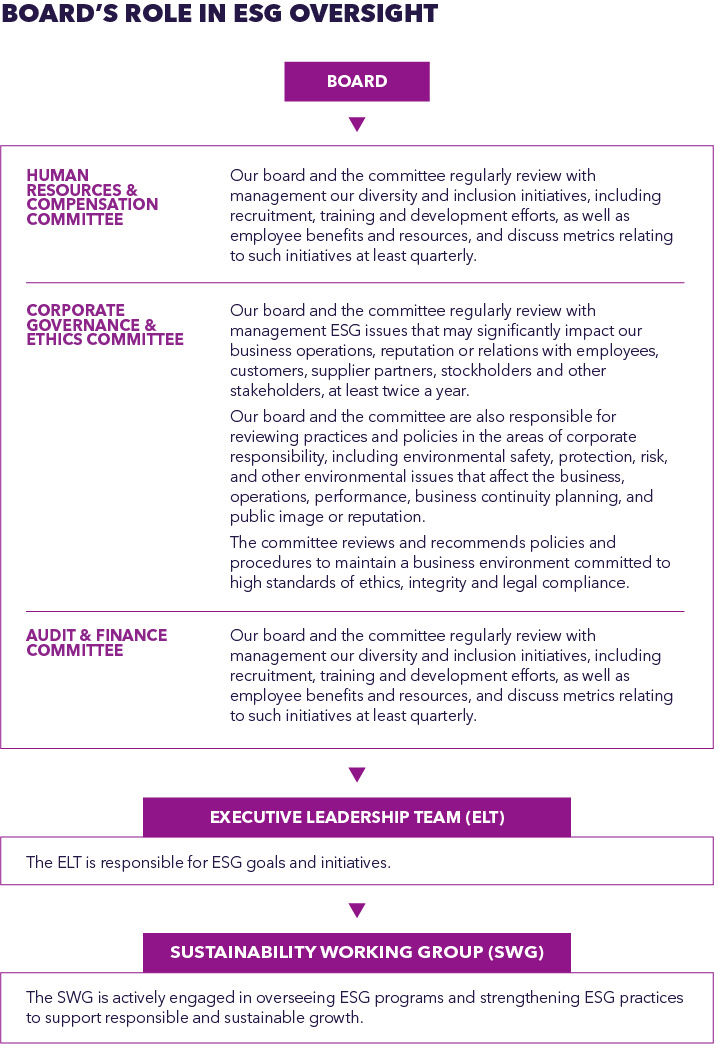ESG & Risk Oversight
Accountability for our performance begins with the Leidos Board of Directors and our CEO, who provide governance and oversight over our strategy, operations and management, including ESG efforts. The Executive Leadership Team and the Sustainability Working Group (SWG) oversee our ESG programs and aim to strengthen ESG practices across the enterprise to promote responsible and sustainable growth.
The SWG comprises senior leaders from across Leidos, including representatives from the corporate social responsibility office, corporate real estate, strategy, legal, risk, accounting, tax, internal audit, finance and customer-facing sustainability experts.
The ESG team supports the SWG with cross-company alignment and integration of our ESG goals, implements ESG initiatives and measures the progress made toward these enterprise-wide targets.
The Board of Directors Role in ESG and Risk
Our Board of Directors regularly review with management ESG issues that may significantly impact our business operations, reputation or relations with employees, customers, supplier partners, stockholders and other stakeholders, throughout the year.
Transparency and Accountability
The Board believes that transparency and accountability are a critical part of our ESG strategy. Leidos publishes reports annually in accordance with the latest GRITM Sustainability Reporting Standards and strives for continuous improvement, alignment with industry best practices and leadership in corporate sustainability and responsibility. The Company periodically re-evaluates and updates its sustainability and corporate responsibility programs and how it shares progress with stakeholders.
- In 2019, Leidos produced its first Sustainability Accounting Standards Board (SASB) Disclosure Supplement.
- In 2021, Leidos partnered with outside experts to conduct a formal ESG assessment, including a stakeholder engagement initiative. This engagement, alongside an analysis of internal and external trends and aligned with business priorities, helped us develop our ESG Goals. The goals form the basis of the Company’s Sustainability Management Plan and drive progress in priority areas.
- In 2024, Leidos released its 15th Annual Sustainability Report covering the calendar year 2023, integrating its GRI Index, SASB Standards, and Task Force on Climate Related Financial Disclosures (TCFD) Index into one document to provide a comprehensive view of corporate practices in this area.
- Leidos publishes an annual EEO-1 report, which includes information regarding its workforce diversity.
Risk Oversight
As part of its oversight function, the Board and its committees monitor risk throughout the year. When granting authority to management, approving strategies, making decisions and receiving management reports, the Board considers, among other things, the risks facing the company. Learn more about how the Board oversees risk in particular areas through its committee structure in our 2024 Proxy Statement.
Leidos management also maintains an Enterprise Risk Management Council, composed of the Chief Executive Officer and senior executives that, among other things, establishes the overall corporate risk strategy and reviews policies, systems, processes and training with the goal of identifying and addressing appropriate risk matters within the company. The Audit and Finance Committee and the full Board are regularly updated on the committee’s activities and findings, which highlight the key risks we face and management’s actions to address those risks
Board's Role in Oversight of Cybersecurity and Related Risks
Information security is critical to maintaining the trust of our customers and business partners, and we are committed to mitigating risks and protecting our data and systems. We maintain comprehensive technologies and programs intended to ensure our systems are effective and prepared for data privacy and cybersecurity risks, including regular oversight of our programs for security monitoring for internal and external threats to safeguard the confidentiality, availability, and integrity of our information assets. We regularly perform evaluations of our security program and continue to invest in our capabilities to keep our customers, partners, and information assets safe. As a government contractor and a provider of information technology services, we are entrusted with highly sensitive information, and we are continuously exposed to unauthorized attempts to compromise this information through cyberattacks, the risk of insider threats and other information security risks.
Environmental Matters
We have established a management-level SWG, comprised of senior leaders from across the Company, including customer-facing sustainability experts. The SWG is actively engaged in overseeing ESG programs and strengthening ESG practices to support responsible and sustainable growth. The SWG conducts biannual reviews of climate-related risks in accordance with the Task Force on Climate-related Financial Disclosures (TCFD) best practices. Climate-related operational opportunities are reviewed biannually and managed by the SWG in parallel with outside experts. Climate-related business opportunities are generally managed by the business lines at least at the business group-level and are reviewed quarterly.
Please see the Leidos 2024 Proxy Statement for additional Governance information.
